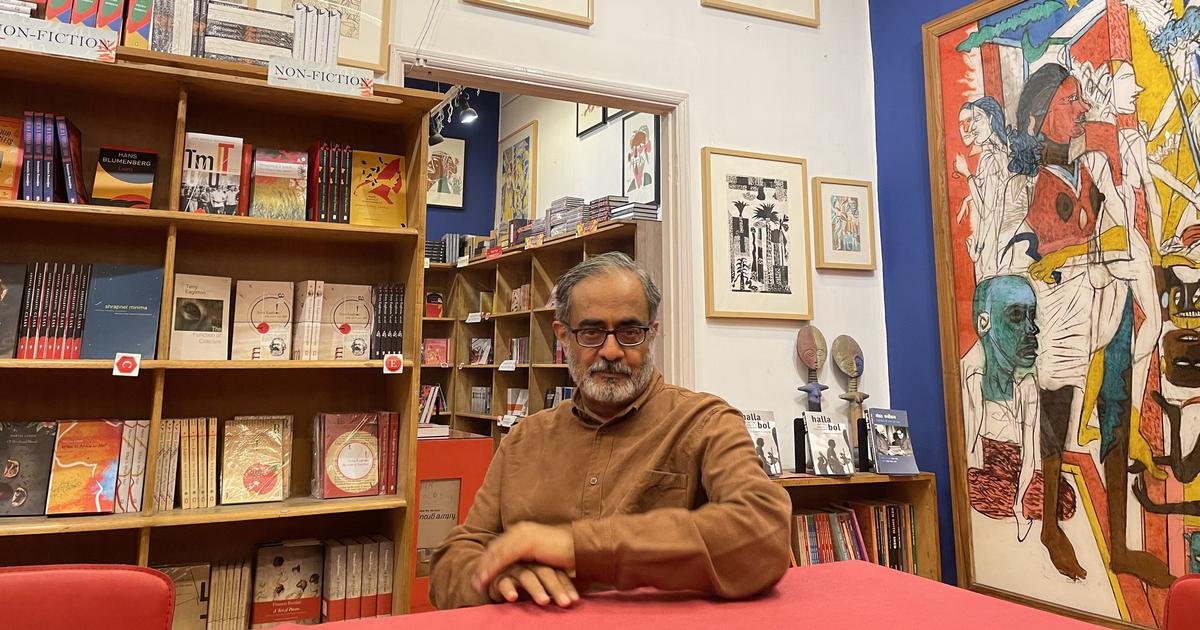Photo: Leah Jing McIntosh
Naveen Kishore on the history of Seagull Books, intuition, and challenging status quo
Saadia Ahmed
It was the year 1982 when Seagull Books was established by the theatre lighting designer Naveen Kishore in Kolkata, India. Initiated with a vision to publish literature on theatre, art, and cinema, today Seagull Books publishes literary works ranging from fiction to non-fiction, English literature to the translations of World Literature, and whatnot. Seagull Books is not limited to publishing but is also the proud platform housing Seagull Publishing School, Seagull Foundation for the Arts, and Peaceworks. It is one of the most prestigious publishing houses in the world with offices in London, New York, and the hometown Kolkata. Naveen Kishore, the man behind Seagull Books was kind enough to walk Portside Review through his journey from 1982 to 2021 and beyond. Based in Kolkata, Naveen started working at a young age with an urge to survive and thrive after his father’s death. Let’s hear what this inspiring publisher has to say about Seagull Books, his motivation, and shattering the status quo.
— —
Saadia Ahmed
Today Seagull Books is one of the most promising publishing houses in the world. Going back to 5 March 1972 from where it all started, what was the thought process behind setting up a publishing house? Were you always into literature?
Naveen Kishore
20 June 1982. That’s when we began to publish. Books in the arts and theatre and cinema to begin with. The 1972 date you speak of is another life. One in music. And theatre. And dance. Cinema. And survival in the arts. Before our publishing avatar there was another. One that gave us our name, Seagull. Fresh and almost out of college, some of us began to present everything from rock music to Indian classical music and dance and theatre and art and cinema events. More out of a desire to make a living in the arts. Something that in India was always treated as a hobby. You did excellent theatre but were expected to remain an ‘amateur’ with no hope of a livelihood from this. Instead you did a 9-5 job and the arts was an after-hours hobby. Not for us.
The books happened overnight. Tangible versus the ephemeral. Out of a desire to document the arts activity we were already engaged in. No other publisher was focusing on the arts. In a different era when linotype and letterpress and block-making and hand-sewn binding was the norm. Technology hadn’t discovered Apple or desktop publishing yet. It would. Soon enough.
So to answer your question simply, the urge to publish came out of this need to document contemporary Indian theatre and cinema and art. And yes, I was indeed into literature and theatre. Before publishing I made a living designing theatre lighting. Another life.
Saadia Ahmed
Seagull Books started with the thought of providing the much-needed publishing house for theatre and related art forms. Today you are publishing books that are not limited to performing arts only. Was this transition organic or instinctive?
Naveen Kishore
Everything about Seagull these last almost-forty years of our existence has been in an intuitive relationship with what we do. The books we make. The authors and translators we work with. Organic. Accidental. Impulses happen. Risks are taken. Possibilities open up. Often the turning of ‘possibility’ into an act of creativity works. Relationships grow. Seagull remains a kind of ‘riyaz’, a practice that is both plastic and dynamic. We do not work with existing structures. Not for the sake of being different. More out of a sense of finding one’s way without a compass or a map. Discovering different ways of being a publisher with all the hidden nuances within that word.
Saadia Ahmed
In 2005, you set up an independent publishing house in London which has played a significant role in challenging the status quo in Britain and around the world. Please take us through the work of Seagull Books Limited London.
Naveen Kishore
I would put it a little differently. Yes, we exist as Seagull Books London Limited for the last fifteen years. Yes, it was set-up as a small independent house that believed in the ‘globalized’ nature of publishing and therefore questioning the status quo of who gets to publish what and from where. Remember, as publishers based in India, we have always been up against a certain kind of English language publishing in the West that allowed us to only secure buy right publish distribution in India or at best the Indian subcontinent while they cherry picked for the rest of the world. So, when I use the phrase ‘upsetting the status quo’ all I mean is that the Seagull London Project only buys world rights for every single book we bring into the world. Seventy percent of what we publish is translation. We are distributed by the University Press of Chicago into the World. More recently we have tied up with Gazebo in Australia who will both co-publish and distribute a selection of our titles exclusively in Australia and New Zealand.
Saadia Ahmed
You are committed to bring a change in the society through The Seagull Foundation for Arts which has done many ground-breaking projects like Peaceworks and History for Peace. Despite their shared history and heritage, India and Pakistan have not always enjoyed the most amicable diplomatic relationships. How are your projects, Peaceworks and History for Peace, bridging the gap among the common people of both countries?
Naveen Kishore
I am not sure we have succeeded in bridging gaps alas. There was a time many years ago when we were able to make visits to each other. We visited schools, had people visiting us, did books like Stories for Peace and Poems for Peace; but now getting visas for each other to attend events or workshops or conferences is not allowed. A pity. History for Peace and the other Peaceworks events are very vital in themselves and not just with Pakistan but also with Bangladesh and Sri Lanka and of course within the many Indias that exist in our own Nation state. But it is a drop in the ocean in this difficult world with increasing animosity towards each other. The irony of course remains that, at the individual level, or at the level of civil society or between writers and artists, there is only friendship and an eagerness to work in friendship. The powers that be who rule over our two counties make it impossible to do so.
Saadia Ahmed
You are also the founder of The Seagull School of Publishing that aims to provide a holistic training to create publishers and editors and designers. During the pandemic we have seen a shift from the traditional on campus teaching to online learning around the world. This has also opened doors for remote learning. Is Seagull Publish School also now open to publishers who are not based in India?
Naveen Kishore
Our school was always open to other countries. We have students coming to us from many other parts of the world. What hasn’t happened despite efforts on both sides at a people-to-people level is young people from Pakistan who constantly get denied entry visas! So, the online we are hoping will allow us to invite them next year. Or so I hope. We also hope to have students joining us from Ethiopia and closer to home Cambodia next year.
Saadia Ahmed
The political landscape in India and around the world has changed drastically over the past few years. There is a constant struggle towards striking a balance between political correctness and creative freedom. Has this shift also affected your publishing strategies?
Naveen Kishore
The short answer is no. When people who care for what we do ask us about our choice of content I always say, ‘anything and everything to do with the human condition’. Something that happens in a remote part of ‘another’ world or ‘elsewhere’ affects me deeply and almost as much as what happens in a small town in India. What you politely call ‘political landscape’ is actually a viral right-wing strategy that we are all up against. Now is the time to resist and the only way you can do that is to publish what matters without seeking to balance any other niceties, be they politically correct (in whose eyes?) or not. I don’t mean we scream from rooftops or even the barricades. I merely mean that now more than ever publishing is closer to a certain kind of resistance than ever before. And yes, it comes with its attendant fears and anxieties, but you need to learn to perform the ‘brave’ and the ‘courageous’ for if not now then, when?
Saadia Ahmed
Seagull Books is turning 40 next year. How do you plan to celebrate this milestone?
Naveen Kishore
Quietly. Without fanfare. There is a plan to publish a special imprint called ‘Seagull at 40’. In affirmation of the written and spoken word. Wait and watch!
Saadia Ahmed
Apologies for this cliched question which you must have been questioned many times, but I must take the liberty to ask. Writing and editing are not considered financially sustainable professions. What advice would you give to the aspiring publishers, editors, writers, and creatives to create a niche of their own in this field?
Naveen Kishore
Sustain versus sustenance. Subtle lines of difference but they exist. I don’t agree that writing and editing are not viable financially. Otherwise, none of us would survive. Yes, it may not be comparable with many other corporate possibilities before our young but the nourishment that comes from these professions or ‘ways of living’ is another wonderful thing. Not much advice needed. If your passion for the written word makes you want to be a writer or an editor, by all means, follow your gut-heart. It is a lovely world, and it sustains and nurtures your mind more than many other professions may do.
Saadia Ahmed
And last but not the least, what are you reading right now and why would you recommend it to our audience?
Naveen Kishore
Lucille Clifton’s Selected Poems, Re-reading all the Arendt’s and a lovely old Kate Soper called ‘What is Nature?’ And oh yes, a fourth book called ‘Music Lessons’ by Pierre Boulez. And no, I wouldn’t dare recommend anything to your audience. Let them find their own way to the books they must read.
A theatre practitioner by heart, Naveen Kishore is the founder and managing director of Seagull Books in Kolkata which began primarily as a response to the growing need for an Indian publishing house for theatre and other arts.
Saadia Ahmed is a writer, vlogger, blogger and storyteller. Hailing from Lahore, Pakistan, she is now based in Australia. Her work is regularly published in leading publications in Pakistan with special emphasis on human rights in general and women rights in particular.





